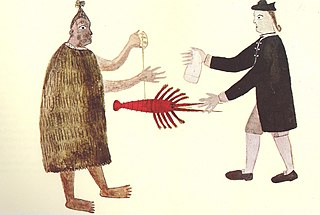
The politics of New Zealand function within a framework of an independent, unitary, parliamentary democracy. The system of government is based on the Westminster system, and the legal system is modelled on the common law of England. New Zealand is a constitutional monarchy in which King Charles III is the sovereign and head of state, while his prime minister serves as the head of government.

The Treaty of Waitangi, sometimes referred to as Te Tiriti, is a document of central importance to the history of New Zealand, its constitution, and its national mythos. It has played a major role in the treatment of the Māori people in New Zealand by successive governments and the wider population, something that has been especially prominent from the late 20th century. The treaty document is an agreement, not a treaty as recognised in international law, and has no independent legal status, being legally effective only to the extent it is recognised in various statutes. It was first signed on 6 February 1840 by Captain William Hobson as consul for the British Crown and by Māori chiefs from the North Island of New Zealand.

The Dominion of New Zealand was the historical successor to the Colony of New Zealand. It was a constitutional monarchy with a high level of self-government within the British Empire.

The monarchy of New Zealand is the constitutional system of government in which a hereditary monarch is the sovereign and head of state of New Zealand. The current monarch, King Charles III, acceded to the throne following the death of his mother, Queen Elizabeth II, on 8 September 2022 in the United Kingdom. The King's elder son, William, Prince of Wales, is the heir apparent.

The Ireland Act 1949 is an Act of the Parliament of the United Kingdom intended to deal with the consequences of the Republic of Ireland Act 1948 as passed by the Irish parliament, the Oireachtas.

Australian nationality law details the conditions by which a person is a national of Australia. The primary law governing nationality regulations is the Australian Citizenship Act 2007, which came into force on 1 July 2007 and is applicable in all states and territories of Australia.

New Zealand nationality law details the conditions by which a person is a national of New Zealand. The primary law governing these requirements is the Citizenship Act 1977, which came into force on 1 January 1978. Regulations apply to the entire Realm of New Zealand, which includes the country of New Zealand itself, the Cook Islands, Niue, Tokelau, and the Ross Dependency.

The primary law governing nationality of Ireland is the Irish Nationality and Citizenship Act, 1956, which came into force on 17 July 1956. Ireland is a member state of the European Union (EU) and all Irish nationals are EU citizens. They are entitled to free movement rights in EU and European Free Trade Association (EFTA) countries and may vote in elections to the European Parliament.

The Statute of Westminster Adoption Act 1947 was a constitutional Act of the New Zealand Parliament that formally accepted the full external autonomy offered by the British Parliament. By passing the Act on 25 November 1947, New Zealand adopted the Statute of Westminster 1931, an Act of the British Parliament which granted full sovereign status and Commonwealth membership to the Dominions ratifying the statute. New Zealand was the last Dominion to do so, as the Dominion of Newfoundland voted to become a part of Canada in 1948.

The constitution of New Zealand is the sum of laws and principles that determine the political governance of New Zealand. Unlike many other nations, New Zealand has no single constitutional document. It is an uncodified constitution, sometimes referred to as an "unwritten constitution", although the New Zealand constitution is in fact an amalgamation of written and unwritten sources. The Constitution Act 1986 has a central role, alongside a collection of other statutes, orders in Council, letters patent, decisions of the courts, principles of the Treaty of Waitangi, and unwritten traditions and conventions. There is no technical difference between ordinary statutes and law considered "constitutional law"; no law is accorded higher status. In most cases the New Zealand Parliament can perform "constitutional reform" simply by passing acts of Parliament, and thus has the power to change or abolish elements of the constitution. There are some exceptions to this though – the Electoral Act 1993 requires certain provisions can only be amended following a referendum.

The independence of New Zealand is a matter of continued academic and social debate. New Zealand has no fixed date of independence from the United Kingdom; instead, political independence came about as a result of New Zealand's evolving constitutional status.

The Treaty of Waitangi Act 1975 gave the Treaty of Waitangi recognition in New Zealand law for the first time and established the Waitangi Tribunal. The tribunal was empowered to investigate possible breaches of the Principles of the Treaty of Waitangi by the New Zealand Government or any state-controlled body, occurring after 1975. It was also empowered to recommend, but not enforce, remedies.

The New Zealand Day Act 1973 made 6 February a public holiday in New Zealand. The day had been known for some time as Waitangi Day and commemorated the signing of the Treaty of Waitangi. In 1960 the first Waitangi Day Act was passed by the second Labour Government, enabling any area of the country to substitute a Waitangi Day holiday for its provincial anniversary day. This was done for Northland in 1963 through the Waitangi Day Amendment Act passed by the second National Government.
The law of New Zealand uses the English common law system, inherited from being a part of the British Empire.

New Zealand–United Kingdom relations are the bilateral relations between New Zealand and the United Kingdom. New Zealand has maintained a close relationship with Britain, since gaining independence from the United Kingdom.

The British Nationality Act 1948 was an Act of the Parliament of the United Kingdom on British nationality law which defined British nationality by creating the status of "Citizen of the United Kingdom and Colonies" (CUKC) as the sole national citizenship of the United Kingdom and all of its colonies.

The primary law governing nationality in the United Kingdom is the British Nationality Act 1981, which came into force on 1 January 1983. Regulations apply to the British Islands, which include the UK itself and the Crown dependencies, and the 14 British Overseas Territories.

Pakistani nationality law details the conditions by which a person is a national of Pakistan. The primary law governing these requirements is the Pakistan Citizenship Act, 1951, which came into force on 13 April 1951.

The judiciary of New Zealand is responsible for the system of courts that interprets and applies the laws of New Zealand. It has four primary functions: to provide a mechanism for dispute resolution; to deliver authoritative rulings on the meaning and application of legislation; to develop case law; and to uphold the rule of law, personal liberty and human rights. The judiciary is supported in its work by an executive department, the Ministry of Justice.

In New Zealand law and politics, the principles of the Treaty of Waitangi is a phrase used in the Treaty of Waitangi Act 1975. It is a set of principles derived from, and interpreting, the Treaty of Waitangi. These principles were codified in 1987, partly an attempt to reconcile the different Māori and English language versions of the treaty, and allow the application of the treaty to a contemporary context.












